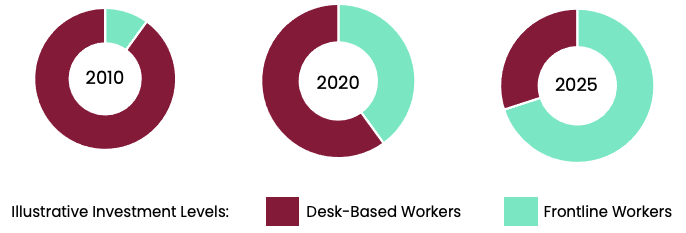Ever since mobile devices started replacing fixed lines and desk phones, the focus has been primarily on knowledge workers. This isn't surprising because the initial implementation of mobile technology aimed at cost optimisation and moving away from legacy technology, rather than reinventing work processes. For office workers, the transition to mobile phones opened the convenience of accessing emails anywhere, followed by using supplementary applications such as expense reporting and various collaboration tools. Most mobile tech investments targeted the office user group, leaving the frontline workforce behind.
Investments Have Shifted
However, this is rapidly changing as companies capitalise on the transformative forces of stable connections, cloud services, low-code/no-code app development, and extremely potent mobile devices, completely altering how work is performed at the edge of their business. According to Gartner (The Rise of the Frontline Worker), mobile technology investments have shifted: In 2010, 90% of these investments were for the desk-based workforce, evening out at a 60/40 split in 2020, and by 2025, 70% of mobile technology investments will go towards frontline workers.

The reason behind this shift, on a macro level, is explained by huge productivity gains and, with that, increased competitive power. The edge of a business, often called the critical last mile, represents the point where all efforts come together, and value is passed to the recipient. Performing tasks more time-efficiently, with increased quality and real-time data passed through to internal and external recipients, has become critical to compete in the market.

The Frontline Mobile Worker Defined
A frontline mobile worker refers to an individual who performs essential job functions directly at the forefront of an organisation's operations. They often work in diverse locations and dynamic environments, relying on mobile technologies to carry out their tasks. These workers are typically engaged in fields like healthcare, field services, retail, logistics, or emergency response, where their physical presence is required for immediate needs and on-site services. The use of mobile devices, like smartphones or tablets, enables them to access real-time information, communicate with colleagues, and perform job-related functions while on the move or at various locations outside a traditional office setting.
What is Important for the Frontline Mobile Workers
Several key factors are important for frontline mobile workers to ensure their efficiency, productivity, and overall success:
1. Mobile Technology and Applications
- Access to reliable and efficient mobile devices, equipped with necessary applications and tools, is crucial.
- Specialised apps can streamline tasks, provide real-time information, and enhance communication.
2. Communication Tools
- Effective communication tools, such as messaging apps, video conferencing, and collaboration platforms, enable frontline workers to keep in touch with their team and get updates quickly.
3. Real-time Information Access
- Instant access to up-to-date information is vital for on-the-go decision-making. This includes inventory status, customer data, job instructions, and any other relevant data.
4. Training and Support
- Ongoing training and support are essential for proficiency in new technologies and adapting to evolving job requirements.
5. Flexibility and Mobility
- Frontline workers should have the flexibility to perform duties from various locations, including remote access to systems or fieldwork capabilities.
6. Task Automation
- Automating routine tasks can save time and reduce errors, allowing frontline workers to focus on more complex and critical aspects of their jobs.
7. Collaboration and Teamwork
- Encouraging a collaborative work environment is important. This involves facilitating communication among team members, providing platforms for sharing insights and fostering a sense of teamwork.
8. Feedback Mechanisms
- Establishing channels for feedback allows frontline workers to provide input on their experiences, challenges, and suggestions for improvement. This helps organisations make informed adjustments to workflows and technologies.
9. Well-being and Work-Life Balance
- Recognising the importance of well-being and promoting a healthy work-life balance is essential. Organisations should strive to balance workloads, minimise stress, and promote a healthy work-life balance.

Three Concrete Areas for Increased Frontline Work Productivity
By addressing these three key areas, organisations can empower their frontline mobile workers to perform optimally, contribute to organisational success, and adapt to the dynamic nature of their roles:
1. Get Rid of Pen and Paper
Pen and paper input/output has served frontline workers well for a long time and it’s still heavily used by the frontline worker to perform critical tasks. However, as highlighted in a study by Microsoft and Forrester Research, one of the key challenges in frontline work is this reliance on pen and paper for managing critical data. The benefits of moving away from traditional pen and paper are quite straightforward. It enables instant data input, cuts down the time spent on recording and processing tasks, and reduces the risk of errors often associated with manual data entry. These advantages make the transition away from pen and paper an attractive option for many.
2. Shorten the Distance
Minimising the physical distance between the task at hand and data entry or retrieval is crucial, both for the workers and the people they serve. For instance, having to go to a storage room or a stationary computer to check inventory, like shoe size, or leaving an elderly patient's side to review medical records before giving a prescription-free painkiller, can be very inconvenient. Lack of immediate access to necessary information not only wastes time but also causes frustration for both the service provider and the recipient.
3. Iron Out the Question Marks
Frontline jobs often see a lot of employee turnover, which means training new staff can be expensive. Even experienced long-time employees need guidance when new procedures or changes are introduced. Providing the workforce with mobile devices and transitioning workflows into a digital, step-by-step format ensures they have the necessary information and can offer feedback at every stage of the work process. This approach creates a win-win situation for all involved. It facilitates quicker training, enhances the quality of work, and minimises errors by resolving any uncertainties frontline workers may encounter.
Read more: Transform your field operations with Mobile Data Capture

What Do the Workers Feel, Think, and Do?
Reports indicate that a massive 80% of the global workforce, which amounts to a staggering number of 2.7 billion people (as per 'Emergence, The Rise of the Deskless Workforce'), are not tied to traditional desk-based roles. This highlights the extensive reach of the digital shift. In more developed countries, the ratio is close to an even split, further emphasising the significant impact of frontline digitalisation across various professions.
Within this landscape, there's encouraging news: the workforce yearns for more technological support in their roles. They recognise the potential benefits that additional mobile technology can bring to crucial aspects of their work, including communication, operations and logistics, onboarding, and training.
However, there is a noticeable dissatisfaction with the current technological provisions. Despite not being tethered to a desk, deskless workers commonly find themselves equipped with desktop PCs and laptops, painting a picture of a technological mismatch. Although smartphones are rapidly gaining ground among these workers, the integration of wearables like smartwatches and glasses remains relatively modest, hinting at untapped potential in enhancing their work experience.
In terms of software, there is room for improvement as well. Users often report their tools as 'slow', 'inefficient', or 'hard to use', particularly when operating on older devices. This impacts user satisfaction and contributes to both direct and indirect losses in productivity.
Read more: Discover differences between managing personal and shared mobile devices
Conclusions and Recommendations
In conclusion, the oversight of deskless workers in the realm of digitalisation and mobile initiatives represents a critical misstep with far-reaching implications for organisational success. The contemporary workforce is increasingly inclined towards embracing more intelligent work methods, not merely as a preference but as an indispensable means to unlock significant productivity gains and cost reductions. This paradigm shift directly contributes to enhancing a company's competitive prowess in the ever-evolving business landscape.
Looking ahead, it becomes imperative for IT managers to recognise the strategic importance of the frontline mobile workforce and prioritise the establishment of a robust mobile tech infrastructure. This infrastructure is not merely a technological investment but a strategic imperative to effectively support diverse frontline digitalisation initiatives. Given that these initiatives typically arise from the operational side of the business, IT departments must proactively engage in their deployment and ongoing support.




.png)